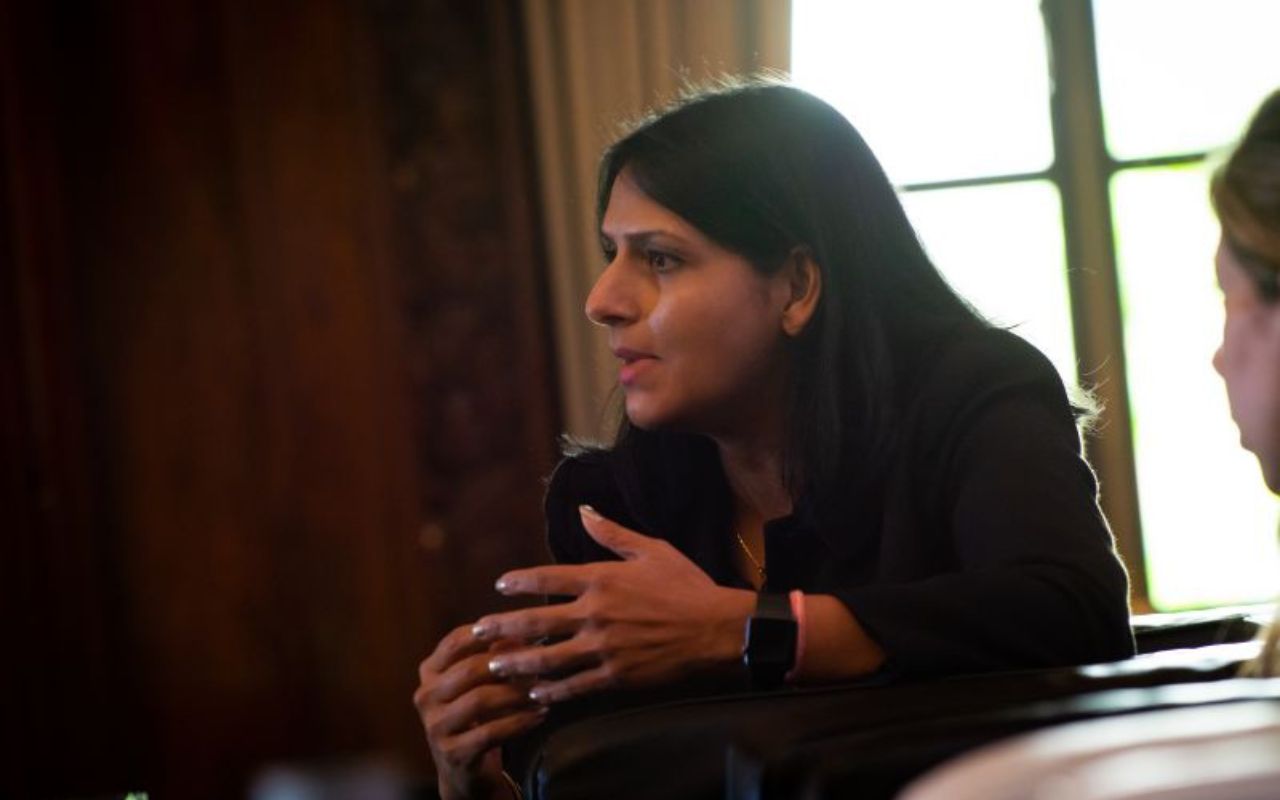In this engaging conversation, Nicole Wiley sits down with Sachee Trivedi, founder of Trident Capital. Possessing a unique blend of engineering and business acumen, Trivedi shares the twists and turns of her professional journey that led her to establish Trident Capital. From her humble beginnings in India to her transformative experience at Columbia Business School, we delve into Trivedi’s perspectives on investments, entrepreneurship, and the role of capital markets in society.
Wonderful to have you here, Sachee. Could you share with us your professional journey and what led you to establish Trident?
Thank you, Nicole. My background is a bit unconventional for an investor. I hold two engineering degrees and an MBA from Columbia. The combination of my analytical thinking skills and broader understanding of the world, coupled with my MBA, aligns perfectly with what is needed in the field of investing. When I attended Columbia Business School, I discovered my passion for investing. It was there that the seed for Trident Capital was planted.
That’s fascinating. It seems many professionals in our field come from diverse backgrounds like engineering and physics.
Indeed. Moreover, growing up in democratic and capitalistic societies like India and the US has shaped my worldview. These environments foster an appreciation for businesses, entrepreneurship, and capital markets. Capital markets are key to shaping the society that we live in, and they naturally drew me to analyzing businesses and understanding their operations.
Absolutely, understanding the ecosystem you live in and the relationships between people and enterprises can catalyze change and progress.
You’re right, but it can also go the other way. For example, today’s society faces issues like income disparity and environmental concerns. I often tell young people that influencing investment capital is a more effective way of impacting the world than holding marches and protests.
Yes, using your capital can be much more impactful. So, let’s talk about how you started your investment journey. Sachee, can you tell us about your approach to investment management?
In my perspective, there are two broad categories of managers. The first type is the professional manager. They are given a mandate, defined sector limits, benchmark, tracking error, and geographical area for investment. They usually do an excellent job at operating within these parameters.
Then there are the “crazy” managers. They believe there’s only one way to invest money, and that is their way. For them, money management is a reflection of their personality, worldview, and emotional resilience. In my opinion, these types of managers should start their own funds to execute their unique strategies. I identify as one of these “crazy” managers.
At business school, I was drawn to the Warren Buffett and Charlie Munger style of investing. This approach involves finding high-quality business models with a protective moat, indicating they earn more than their cost of capital over a long period. There aren’t many such models, but when you find them, you invest and then sit back. While there are other successful investment strategies, this one resonated with me.
Post-business school, I joined a large asset management firm in London. I was a generalist working in global equities alongside an amazing team. After seven to eight years, I had gained significant experience and perspective, helping me decide where I wanted to apply my strategy. The two economies that stood out were the US and India’s.
Starting my fund was an easy decision, as was choosing the Buffett and Munger strategy. Deciding on the geography took more thought. As part of India’s brain drain generation, I migrated economically to the US and Europe. However, witnessing India’s transformation changed my perspective. It reminded me of the US in the 1950s and 60s, transitioning from family-run organizations to those that were professionally managed.
Today, the US market is largely dictated by disruptors transitioning from old to new business models. In contrast, opportunities in India are broad-based as India is still in its infancy in terms of financial sophistication. For example, stock market participation in India is just 4 percent. The potential for growth is enormous, making it an incredibly exciting prospect for investment.
I must say, I’m quite impressed. Reflecting on all you’ve said, I remember I would often quip that I was born three decades too late. Being born in the US, I’m most familiar with its incredibly efficient markets. As you’ve beautifully articulated, we now rely on disruptive events to make significant progress. However, in India, the markets are still maturing, providing a tremendous platform for long-term growth that is similar to what Mr. Buffett experienced in the US during the ’50s. The ongoing de-risking trend is also incredibly significant. As you rightly pointed out, digitization is playing a key role in making these less efficient environments more attractive to a wider investor base. It’s fascinating to see how traditional, time-tested principles can be applied in a different market context.
India presents a unique scenario with a massive population, vast consumer base, and hotbed of innovation and entrepreneurship. So, if you were to conduct a SWOT analysis, you’d see numerous opportunities. I believe you have a fair understanding of potential threats. Being an investment manager comes with inherent risks. Then, there are factors like geography and corruption to consider. So, what do you consider your strengths? Bearing all these factors in mind, you’re now looking to invest your own money, as well as that of friends and family. Let’s get real, even the best ideas don’t always resonate with everyone, which can be slightly baffling.
Over the last twenty years, several Indian firms have provided higher returns than the US tech darlings; these are steady-eddy, basic industrial and consumer goods companies. Despite this, we don’t hear about India fund managers who have created enormous wealth for their investors by investing in such companies. For some inexplicable reasons, investors in emerging markets often go for the fences and take unnecessary risks, and forget that assuming high risks in equity markets is no guarantee for high rewards. As Warren Buffett told Jeff Bezos, no one wants to get rich slowly, which leads to overlooking the value of slow, steady growth compounders.
So, you’re in the market with your own fund in what is considered an emerging market. Can you talk about what your experience has been, given these dynamics and the predisposition of many potential investors to opt for what they know?
I feel confident in Trident’s investment strategy, which is modeled after the best in the industry. I’m also confident about our chosen geography, India, which I believe to be on the cusp of an investing supercycle. Despite our solid operational track record and stellar analyst team, fundraising remains our biggest challenge. I’ve often been the only woman in my educational and professional settings, and that has never bothered me because I believe strongly in meritocracy, grit, and determination. But the fact that only 1.4% of US assets are managed by folks who are not white males feels mathematically wrong. In any healthy industry, the raw material is available to anyone who wants to start a business. The raw material in an asset management business is assets, its capital. This raw material isn’t readily available to everyone, especially to women and minorities. This lack of access to raw material is unique to the asset management industry and is a problem that needs addressing. Allocators hide behind byzantine rules involving checklists, limits and thresholds in the name of fiduciary responsibility. I would submit that food security, housing security, and energy security are critically important for our societies and yet these industries have not reserved the raw material of their industries for a select few. We shouldn’t shy away from taking calculated risks with new players in the market.
My passion and conviction to create wealth for our investors are unwavering. The inequity in our industry has not deterred me from starting my fund. I have invested my own money in the fund, demonstrating my commitment. However, as an industry participant, I believe it is also my responsibility to highlight the flaws in the current system.
You’re right—change doesn’t come from those who strictly follow the rules. Having your future tied to the success of the fund shows your commitment. Moreover, it’s crucial to bring problematic behaviors to light. We often hear about the lack of diversity in management, yet there are many skilled individuals applying tried and tested strategies in new areas. The key is to find investors willing to back these innovative approaches—they are the ones who can truly shift the paradigm.
Absolutely. I don’t seek charity; I want capital allocators to recognize that I am the best person for this role. I have world-class education, training, experience, and an indomitable passion needed to bridge the gap between Western investors and Indian capital markets. If there’s something that I am missing, I welcome the feedback and I will take it on board. Raise the bar high and I will strive to meet it and beat it.
Yes, if there’s someone better, I’d like to know. I’m always looking for opportunities to enhance my business. After all, this is a business, and I invite investors to either invest in me or provide constructive feedback.
Exactly, this is a business. If the only criticism is that “since you don’t manage a billion dollars already we cannot allocate a hundred million dollars to you” then I will raise my voice against this on all forums available to me
Sachee, thank you for speaking so candidly about your journey, your philosophy and Trident.
Your passion for the industry is evident. I wish you continued success and hope that your mission to broaden the thinking of the status quo works to not only create further success for your company, but also positively impacts other women who share your drive for changing the face of the finance industry.

